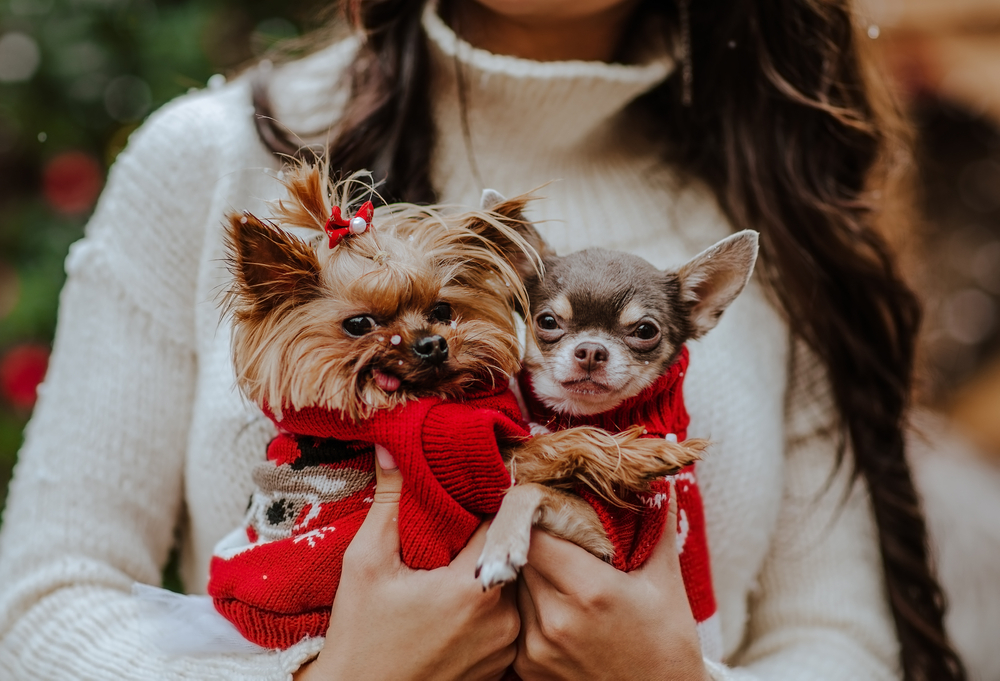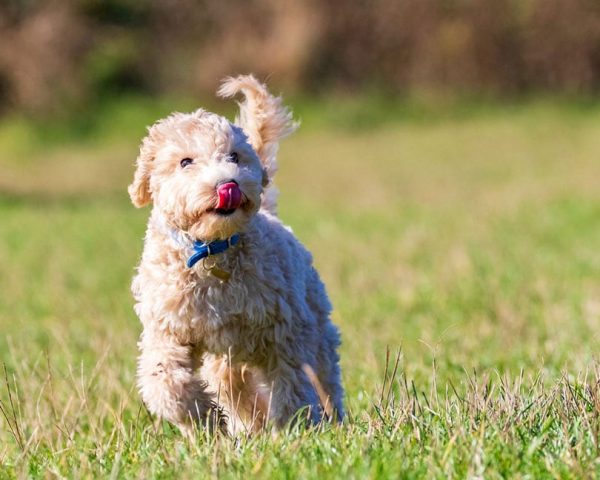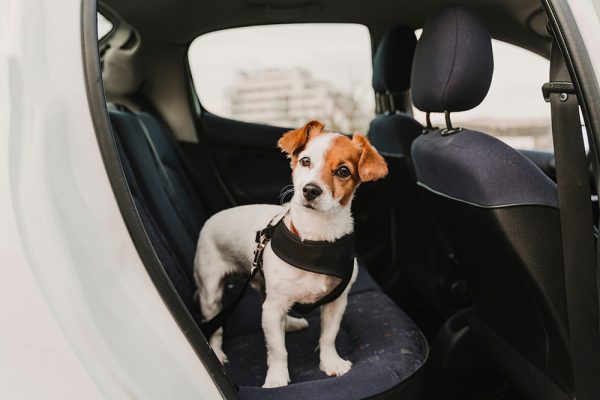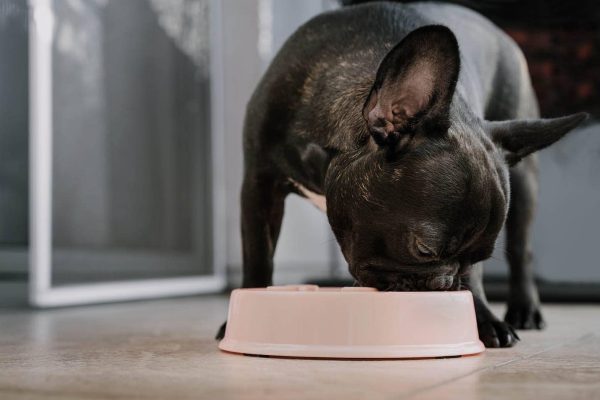Growing up with a dog has almost become a quintessential part of childhood. People love them, and that’s why you’ll find a pup in roughly 62 million American households. They bring us so much joy with their unconditional love, and perhaps that explains why your kids are bugging you to get a puppy. It sounds like the ideal scenario to fulfill their wish at Christmas. What could be more heartwarming?
However, getting a puppy at any time shouldn’t be a snap decision. It’s a serious responsibility you should consider carefully. Our list may seem daunting, but our goal is to help you be sure of your choice. We wouldn’t want your pup to be one of the 3.1 million dogs entering shelters because of a poor fit.

The 14 Things to Consider Before Getting a Puppy for Christmas
1. Cost of Owning a Dog
It’s no secret that dogs cost money, but it’s not uncommon to underestimate their true cost. Your first year of pet ownership is the most expensive since you’re starting from scratch. You can expect to dish out between $1,270 to $2,803 for an average year. That comes out to a lifetime cost of roughly $19,893 to $55,132. That doesn’t even take into account emergency vet care or chronic disease.

2. Time Investment
Owning a puppy isn’t unlike raising a toddler. They get into trouble and do things they shouldn’t. You have to watch them and protect them from themselves. You can’t go off on an impromptu vacation without seeing to the care of your pup. You have to walk your pet at least twice daily, and they need attention and mental stimulation to prevent boredom. Owning a puppy takes up a lot of your time, so if you’re not willing to dedicate that much to them, then maybe a dog isn’t the right choice.
Training is another time investment. While dogs are intelligent, they need guidance. That means repetition of vital lessons and commands, like “sit,” and “stay.” We recommend positive reinforcement to make the lessons stick and foster the bond between you and your pet. Understanding your commitment is crucial.
3. The Responsibility of Socialization
The period between 3 and 14 weeks old is a critical time for a puppy. Socialization is a big part of your responsibility to nurture your dog’s good canine manners. It’s also a time to introduce your pooch to new people and pets. However, you also have to ensure it is done safely until they are fully vaccinated. They should be introduced to novel experiences like riding in the car and being around the vacuum. Your efforts will reduce the risk of fearfulness and aggression in your pup. If you don’t make the time to socialize them, then you’re almost undoubtedly going to experience behavioral problems.

4. Differences in Breed
Breeds vary in their temperament, making researching their characteristics a vital part of your planning. Your kids might want the cute pup they saw on TV for Christmas, but you must be practical. Some dogs aren’t the best choice for households with small children, and some are more energetic than others and require hours of exercise.
Cute-looking, flat-faced dogs are prone to a myriad of health1 problems to the point that veterinary associations around the world are urging people to stop getting any of those breeds. So, you must do thorough research on the breed you plan to bring home to ensure that they would actually be a good fit for your lifestyle.
5. Size and Weight
We recommend determining the adult size and weight of the breed. Consider whether the animal is a good fit for your home and outdoor space. Remember that a large dog needs someone capable of managing them. It’s worth noting some costs are higher for bigger canines when it comes to things like food and boarding. It’s also a factor if you live in an apartment, for example, as some places have breed and weight restrictions.

6. Finding a Reputable Breeder
If you’re sure you want to get a puppy for Christmas, your next task is finding a reputable seller. We recommend checking with the breed’s parent club. These individuals must adhere to specific standards to be a member. We strongly urge you to avoid the so-called backyard breeders. Too often, they are more interested in the money than the care of the puppies. Especially avoid any breeder that doesn’t offer a health guarantee, as you might end up spending more money in the long run by having to make more frequent vet trips or pay for things like medication.
7. Finding a Veterinarian
We recommend finding a vet before you bring your puppy home. Check out what services the clinic offers and their pricing. Scanning reviews on Google Business or Yelp can provide candid testimonies of the individual’s business manner. Of course, ask other pet owners about their experiences. We suggest booking an appointment early since Christmas is often a busy time.
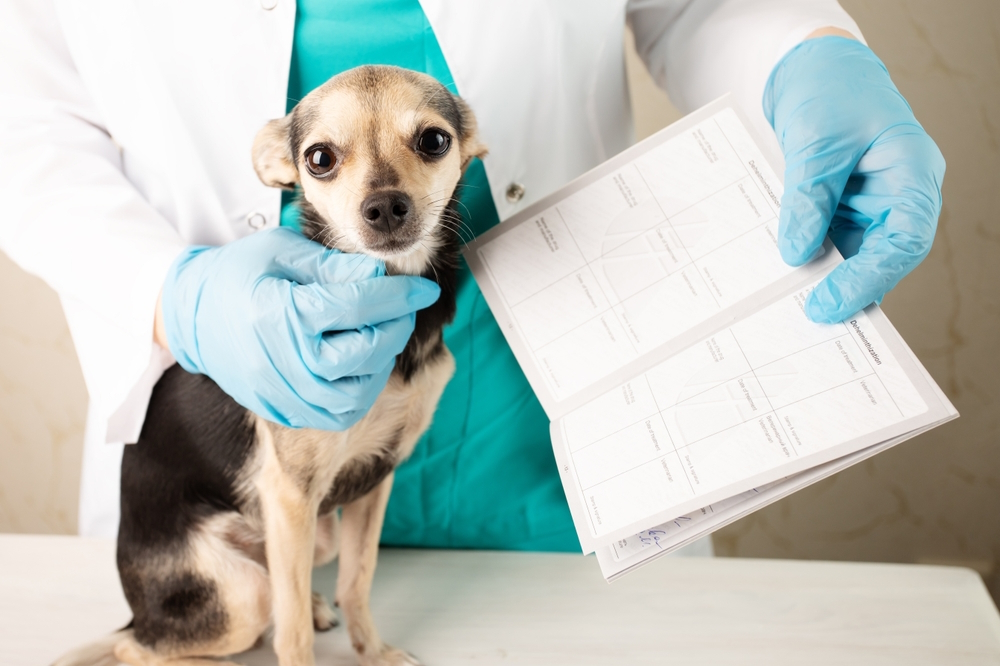
8. Puppy-Proofing Your Home
Remember that a puppy is curious and will likely put anything in their mouth. It’s no wonder that most cases of accidental poisoning occur during the holidays, like Christmas. We suggest having a family meeting to discuss the dos and don’ts of having a puppy in the home. You’ll need to ensure you can actually provide a safe environment for them and that everyone in the house is on board with the rules you’ve set.
9. Investing in Pet Insurance
Getting pet insurance is a wise investment when getting a puppy. The monthly premiums are affordable. It only takes one claim to make it worthwhile. The average ER exam runs between $100 to $200. Many companies also offer wellness add-ons that can help with preventive care, including the annual exams and vaccinations your new pet will need. Of course, you’ll need to add this to the overall cost you’ll need to consider before actually getting a puppy.

10. Outfitting Your Pup
Your new puppy is going to need quite a bit of stuff when you bring them home, and you should get these items before the big day. Plan on buying items like a leash, collar, bowls, a bed, treats, and food. You should choose a diet that’s appropriate for your pet’s size and life stage.
11. Holiday Stress
We understand wanting to give your kids the puppy at Christmas. It’ll add to the excitement of the day. However, holidays are often stressful for parents, especially if you’re having family or friends at your home. Therefore, we suggest considering presenting your gift before or preferably after the holiday. You can focus your attention on the new family member and help the pup transition to their forever home. Once your pup has settled in and matured, it is easier to enjoy the holidays with them.

12. Housebreaking
Housebreaking often takes a while, with some pups taking 6 months or more to learn what they’re supposed to do. Some breeds are more challenging than others, which is where researching the breed comes into play. The other consideration is the time of year. A Christmas puppy means starting these lessons in the winter. That can make it difficult if you or your pet don’t want to be outside in the cold, and you will need to be going out every couple of hours, so it’s definitely something to consider.
13. Day-to-Day Matters
Another vital factor rests with the day-to-day tasks of owning a puppy. The fact that it’s Christmas doesn’t make a difference to your new pet. They will still need to go outside, get trained, and learn the household routine. Consider the timing around the holiday carefully and realistically. Your family will surely be just as delighted to get a puppy in the spring as a surprise gift as a Christmas present.

14. It’s a Long-Term Commitment
Depending on the breed of dog you get, owning a puppy means you are looking into a long-term commitment with something between 8 and 16 years of a living creature that will require your love, affection, and care. This is easier said than done, but once adopting a puppy into your family, you need to be sure you will be able to keep them for good.
Puppies are sentient beings and can not be abandoned once the novelty wears off, as so often happens with other Christmas presents and toys. Planning for years ahead and honestly evaluating if a dog will still fit your lifestyle in the future years is absolutely necessary.

Tips for Getting Your Puppy
We discussed finding a reputable breeder. They will conduct pre-breeding health screenings of their dogs to help ensure they aren’t passing on undesirable traits. The Orthopedic Foundation for Animals (OFA) recommends specific tests for various breeds. You can request this information, but most reputable breeders offer a health guarantee for their pups. You should also ask to see the parents or at least the mother.
These individuals understand the unique needs of puppies. They will start the socialization and housebreaking process early in their young lives. We strongly urge you to avoid getting a puppy under 8 weeks old. These pups have a heightened risk of behavioral issues as adults. We recommend waiting until the pup is closer to 12 weeks old.
The seller should give you the puppy’s medical history, including vaccinations and deworming. The Companion Animal Parasite Council recommends the latter be done every 2 weeks until the pup is 8 weeks old. Avoid buying from anyone who hasn’t taken the puppies to a vet. Don’t hesitate to ask questions. A reputable breeder will understand your concerns.

Conclusion
Few things are more exciting than getting a puppy. Christmas makes it that much more special. However, it’s not a decision you should take lightly, no matter what the time of year. Pet ownership is a serious responsibility that requires careful thought. Even your timing warrants consideration. However, the care you take before bringing home the pup will ensure it’s the right time to welcome a new family member.
- Related Read: What Should I Get My Dog for Christmas? 25 Pawfect Ideas
Featured Image Credit: Alina Tanya, Shutterstock

